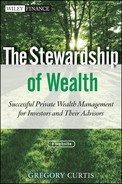Conclusion: Preserving Wealth Is Hard Slogging
There is a Chinese parable about the sage who, having performed an important service to the empire, was asked by the emperor what he would like as his reward.
“All I ask,” replied the sage, “is one grain of rice today, two grains tomorrow, four the next day and so on throughout the remainder of my poor lifetime.”
“Ah,” said the emperor, “surely you must ask for more than that!”
But the sage was firm in his modesty and the emperor agreed to the bargain. It was only a few months later that the emperor learned there was not enough rice in all of China to meet his obligation to the sage. Whereupon, recognizing that he had been evilly tricked, the emperor had the sage executed, bringing to a brutal but effective end this particular episode in the thrill of compound interest.
And that is precisely the point: Nothing compounds forever, or even for very long. Trees start from small seedlings but don't grow to the sky. Some species spawn thousands of offspring, threatening to overwhelm the earth, but few of these offspring live long enough to reproduce. Malthusians30 have warned for more than two centuries that human population growth would quickly overwhelm the world's resources, causing the species to collapse. But it never happens: Between disease, famine, war, and economic and technological progress, the compounding never comes close to what a straight line projection would suggest.
Einstein is famously supposed to have remarked that, although the theory of relativity is certainly interesting, the most remarkable thing in the world is compound interest. But the truth is (talk about disagreeing with an eminence grise!) that the most remarkable thing about compound interest is how frequently its existence tends to be, as Hobbes said of the lives of the English poor, “nasty, brutish, and short.”31
We have explored some of the reasons why the magic of compound interest rarely plays out in the lives of investors, but there are others as well: psychological factors, sociological issues, family dynamics, social and economic disruptions, the collapse of civil societies, and so on. But whatever the reasons, managing an investment portfolio in a taxable, family environment is the most formidable intellectual and psychological challenge Edith, or any other family, will ever face. The sad and simple fact is that most affluent families, faced with the challenges identified by Mr. Bogle and those just mentioned, will not grow their wealth over time, or even maintain it, but will watch helplessly as it disappears before their very eyes.
We are all so numerate these days that total return numbers trip lightly off our tongues. But those are sly devils as numbers go, Miltonesque Satans luring us into traps from which, unless we are very wary, there is no escape. And what escape there is involves not just a numerate understanding of how things actually compound and how they don't, but a very large degree of hard slogging, the paying of minute attention to the issues that count—if, that is, like Edith, we hope to pass along our capital intact to a future generation.
